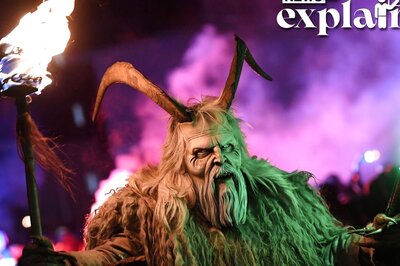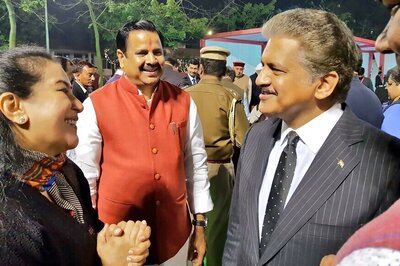
views
Dhaka: Bangladesh's former dictator Hussein Muhammad Ershad on Tuesday was laid to rest with full state honours at his ancestral home in Rangpur in a dramatic turn of events, which forced his family and his Jatiya Party leaders to change their decision to bury him in Dhaka.
The 91-year-old former president died on Sunday due to complications from old age at the Combined Military Hospital (CMH) in Dhaka. His family members and party leaders had said that his body will be flown on Tuesday to his ancestral home district in Rangpur for common people to pay their tributes. He will then be brought back to Dhaka the same day for burial at the Banani army graveyard.
However, after the body reached Rangpur, thousands of people who joined the funeral service virtually laid a siege to the coffin van and forced the vehicle to be driven to Ershad's ancestral residence, 'Palli Nibash', where a grave was dug for him overnight by the locals, Jatiya Party leaders said.
"It appeared impossible to ignore the love of the people in Rangpur for him," Ershad's wife Raushan, said in a statement in Dhaka. She also expressed her desire to be buried beside her husband after her death.
Army bugles played the last post and military troops fired in the air as Ershad's body was laid to the grave at 'Palli Nibash' in the presence of ministers, politicians and several thousand people.
"With the death of General Ershad, a prominent factor in Bangladesh politics has come to a close. From a soldier to a military dictator and then to a political leader, Ershad would surely be regarded by many as lucky," the Daily Star newspaper wrote.
President Abdul Hamid and Prime Minister Sheikh Hasina mourned Ershad's death and prayed for the eternal peace of the departed soul.
Ershad, the Jatiya Party chief and also the leader of the opposition in Parliament, was admitted to the Combined Military Hospital (CMH) on June 22 after his condition deteriorated.
The former president breathed his last at 7:45 am on Sunday at the intensive care unit of the facility where he was kept in life support for the last nine days after his organs gradually stopped functioning.
A former army chief, Ershad took over the state power in a bloodless coup in 1982 and subsequently ran the country for eight years until he was forced to quit in a pro-democracy mass upsurge in 1990.
Despite being imprisoned subsequently on several charges, Ershad emerged as one of the most powerful political leaders in the 1990s after his Jatiya Party became the country's third biggest political outfit. He was elected to parliament several times, once contesting from the prison even.
Ershad, who was also a prolific poet, was considered to be a soft hearted person in private life though he faced with iron hand the opposition street campaigns to topple him during his nearly a decade of rule, first as a dictator and then as an elected president.
His rule was marked by a controversial move to make Islam the state religion of the officially secular Bangladesh.
Ershad was born in 1930 in Dinhata, a subdivision of Coochbehar district of present-day India's West Bengal to Mokbul Hossain and Mazida Khatun. His parents migrated from Dinhata to Bangladesh (the then East Pakistan) in 1948 a year after the the India-Pakistan partition.
He was one of the nine siblings.
Ershad studied in Carmichael College in Rangpur, and later graduated from the Dhaka University in 1950. He joined the Pakistani army in 1952, when Bangladesh was part of Pakistan.



















Comments
0 comment